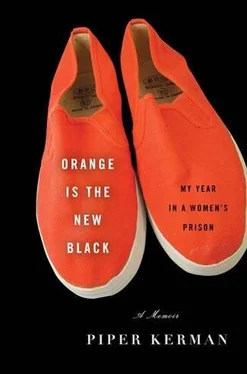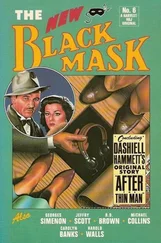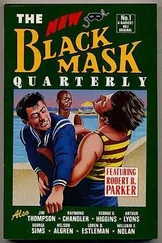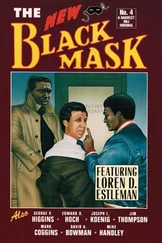Motherhood in prison was revered but also complicated by separation, guilt, and shame. To my eye, my fellow prisoners were mostly ordinary poor or middle-class mommies, grandmas, and even great-grandmothers, and yet some of them were serving very long sentences-five years, seven years, twelve years, fifteen years. I knew that, by virtue of being in the minimum-security Camp, they were unlikely to have been convicted of violent crimes. As I watched my neighbors, young women who lacked even a high school education, with their children in the visiting room, I found myself asking again and again (in my head), What could she possibly have done to warrant being locked up here for so long? Criminal masterminds they were not.
In the three months since my arrival in Danbury I had seen a number of pregnant women become mothers; in February young Doris was the vessel of my first prison nativity. I had never seen a woman in labor before and was both mesmerized and horrified to watch Doris enter a zone in which her body and her baby were taking over, regardless of surroundings. To my fascination, the population of the Camp snapped to attention and stepped in to help her as much as anyone could. She had a half-dozen surrogate midwives hovering over her at any given moment, checking to see what she needed, coaching her on how to get more comfortable, relating stories of their own labors, and reporting on her progress to an anxious audience of prisoners. The staff certainly wasn’t paying much attention to what was happening; prison births were no big deal to them.
It was Doris ’s first child, and all she wanted to do was curl up in her bunk, which apparently was not a good thing for her or the baby struggling to be born. Older women took turns walking with her up and down the long main hall of the Camp, talking to her gently, telling stories, and cracking jokes. Observing keenly was Doris ’s roommate, also heavy with her first child and due any day. They both looked scared.
The next morning, as the contractions were growing closer, Doris was taken off to the hospital in handcuffs. In many places in the United States pregnant female prisoners are kept chained in shackles during their deliveries, a brutal and barbaric practice, though this was not the case for poor Doris. After many hours of labor she gave birth to a nine-pound baby boy in Danbury Hospital and was brought back to prison immediately, pale and drawn and sad. Her mother took the baby back to the rural outpost where she lived, eight hours away. There wasn’t much chance that the new arrival would see his father anytime soon- Doris told me that her baby’s daddy had just been picked up on three outstanding warrants. Fortunately she was due to go home within the year.
I hadn’t witnessed anything at Danbury to allay my fear of childbirth, but for the first time I had some tiny insight on the mother-child relationship. The single most reliable way to get another prisoner to smile was to ask her about her children. There were always families in the visiting room; this was both the best and the worst thing about the many hours I spent there. Young children were growing up while their mothers did time, trying to have a relationship via fifteen-minute phone calls and the hours spent in visitation. I never saw these women look happier than when they were with their children, playing with the small collection of plastic toys kept in the corner and sharing Fritos and Raisinets from the vending machine. When visiting hours were over, it was gut-wrenching to watch the goodbyes. In one year a child could change from a squirming baby to a boisterous talkative toddler and mothers would watch football championships and prom nights come and go from the distant sidelines, along with their children’s graduations, wedding days, and funerals.
As tough as it could be for a prisoner to visit with her children, it was also hard for parents to see their babies locked up. There were so many young girls among us, eighteen and nineteen years old. Some of these kids had been heading to a place like Danbury for some time, but one bad decision could suddenly land a young woman in a merciless and inflexible system. A lack of priors and a history of general good conduct didn’t matter at all-federal mandatory minimums dictated sentences, and if you were pleading guilty (the vast majority of us did), the only person with real leeway in determining what kind of time you would do was your prosecutor, not your judge. Consequently there were sad-looking parents visiting their kids-though not mine. My mother was like a ray of sunshine in that room.
For our visits every week my mother was always dressed immaculately in soft, cheerful colors, with her blond hair carefully styled, her makeup perfectly applied, wearing a piece of jewelry that I had given her for a distant Christmas or birthday. We would talk for hours about my brother, her students, my uncles and aunts, the family dog. I would fill her in on whatever new electrician’s skill I’d learned that week. She always seemed perfectly comfortable in the visiting room, and every time she visited, I got comments from other prisoners afterward. “Your mama is so nice, you’re a lucky girl,” or “That’s your mother? Get out! I thought it was your sister!”
I had been hearing that one most of my adult life. People would often say it to her as well, and even though she had received that compliment approximately three thousand times before, it always made her glow. In the past, this familiar exchange made me feel resentful. Do I look like I’m in my late forties or fifties? But now I enjoyed watching her pleasure when people drew a close comparison between us. Even with this disaster I had dragged us all into, she was still proud to be my mother. It occurred to me that I had never seen my mother defeated, even when life presented difficulties and disappointments. I hoped that our resemblance extended beyond our blue eyes.
My father, more than a thousand miles away, was able to come visit me when the academic year was over. His relief when he saw me was palpable. I have always been a daddy’s girl, and I could tell how it pained him to see his baby, even a baby in her thirties, in a place like this. We still enjoyed our time, eating peanut M &Ms while I spun all the intrigues of the place out for him to absorb. The difference between our weekly phone calls and an actual in-person conversation was like a text message versus a weekend-long visit. If there was one silver lining to this whole mess, it was the reminder of my family’s greatness.
I had a lovely visit with my mother that Mother’s Day-although the visiting room was deranged. I had never seen it so crowded with large family groups. A lot of women in Danbury had families who lacked the resources to come and visit often, even though many of them lived in New York City. Tired grandmas and aunties, taking care of their daughter’s or sister’s children during their prison stays, had a very hard time marshaling toddlers and teenagers on the buses, trains, and taxis necessary to get to Danbury-the trip could take four hours each way from the city and cost money. But Mother’s Day was special, and children of every age swarmed the place, and a cacophony of conversations flowed in many languages and accents. In the midst of all of it was my mother, smiling happily when she spotted me walking into the madness.
TWO COPIES of The New Yorker arrived for me at mail call, to my horror. Someone out there had sent me a second subscription. Miss Esposito from C Dorm also got the magazine, and had been mad at me when my first copy showed up in March-she thought it was a waste of money for both of us to get it. The damn things were piling up all over the prison.
Esposito was an odd duck. A big, solid woman in her fifties, she wore her dark hair in a disconcertingly girlish Dutch boy bob. She was always part of the welcome wagon for any new prisoner, regardless of race-she herself was Italian-American. She volunteered that she had been a gang leader with the Latin Kings, a claim I was at first skeptical about-why would the Latin Kings have an Italian Queen?-but it turned out to be true. She was a former 1960s radical intellectual who’d gotten involved with gang activity at a pretty high regional level. Esposito was doing a long, long sentence.
Читать дальше












